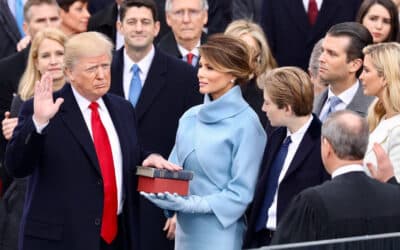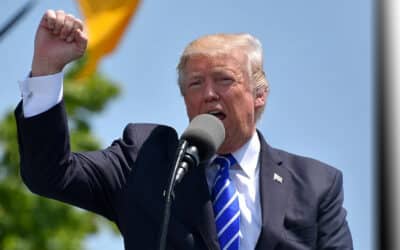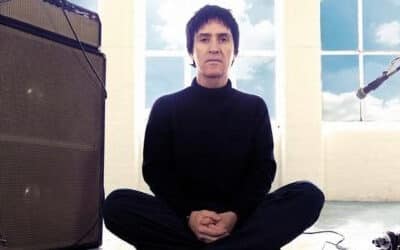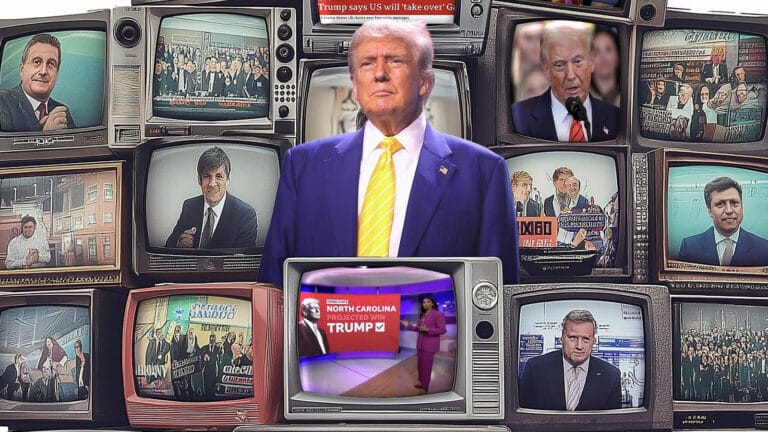A new report from Manchester broadcast media specialist Be Broadcast’s Mission Control monitoring tool has revealed the overwhelming Trumpification of the UK broadcast media since the US president’s inauguration in January.
Trump’s name has been mentioned once every four minutes and 25 seconds in the UK broadcast media since he was sworn in on 20th January 2025, a total of 43,942 mentions, dwarfing UK political figures including PM Keir Starmer, who received just 11,567 mentions alongside Trump in the same period.
Surprisingly, or perhaps unsurprisingly given their close relationship and political affinity, and maybe serving as an indication of how effective populist rhetoric can be at beguiling the UK media, Reform leader/director and perennial BBC News guest Nigel Farage was the most mentioned UK politician with 13,452 namechecks.
The analysis examined all of Trumps 43K+ editorial mentions for topicality, tone, and trends, highlighting the influence Trump has in shaping the UK news cycle. In short, it identifies the impact of the Trump playbook on broadcast coverage.
The report further stresses the strategic importance of understanding broadcast trends for businesses and brands navigating the fast-moving media landscape that defines the broader news agenda.
This data spans all editorial news outlets, covering consumer, political, and business sectors. It demonstrates the widespread impact of Trump-related coverage, and reflects how marketing and PR professionals across all industries must proactively assess how these narratives influence their messaging and strategy.
Key Findings:
- Peak Coverage Hours: Mentions of Trump are highest during morning news bulletins (7 AM to 9 AM) and prime-time discussions (6 PM to 9 PM), driving key narratives.
- Most Active Media Outlets: Times Radio (2,072 mentions), BBC World (1,882), and Sky News Radio (1,834) lead the coverage. Bulletins shape the broader conversation, while feature content follows specific audience tones that align with the news itself.
- Regional media: Among regional outlets, London’s LBC News was by far the most Trump-obsessed, with 1,727 mentions, followed by LBC itself with 1,280. Among BBC local radio, BBC Radio Scotland Trumped the rest with 454 mentions while BBC Kent was least in thrall with 167. The least obsessed regionally were BBC York and BBC Stoke on 178 mentions each
- Major Coverage Spikes: Significant surges occurred around Trump’s Super Bowl attendance on 9th February 2025 and discussions about his inauguration on 21st January 2025, reflecting the impact of UK media’s time zone considerations.
- Comparison with UK Political Figures: Trump’s media presence surpasses that of key UK politicians. Here, perhaps in a worrying sign of the effectiveness of populist rhetoric, Nigel Farage leads with 13,452, followed by the actual PM Keir Starmer (11,567), Boris Johnson (9,874), and Kemi Badenoch (4,862). As a result, planning their whereabouts and media Q&As is crucial, as soundbites will shape activity.
- Media Sentiment: Sentiment varies across coverage, with many outlets opting for a neutral “update” narrative. However, sports outlets provided the most positive sentiment due to Trump’s Super Bowl attendance. London Live, which has now ceased broadcasting, carried the most negative-leaning coverage.
How UK Media Trends Impact PR Strategy
Be Broadcast’s Mission Control provides crucial insights into how media cycles function, helping brands adapt their messaging. This can be done proactively to strategically increase broadcast share of voice in a measured format or to understand the steps needed in a PR crisis or issues management scenario.
The report outlines five key considerations for businesses:
- Crisis and Rapid Response Communication: Companies must stay agile, anticipating Trump-related stories that may overshadow other news. Forward planning and tracking Trump’s movements are important. The ability to pivot or understand broader subject narratives is key. For example, a consumer finance piece may now require a prepared view on how tariffs impact consumers’ pockets, without political overspill.
- Perception Management: Understanding how UK media frames US political narratives allows brands to position themselves effectively without needing to engage in direct debate. Planning ahead and deep-diving into other factors impacting the news agenda is vital.
- Emotional and Visual Storytelling: High-impact, shareable content is essential for cutting through the noise. Media outlets increasingly demand relevance and clarity. Brands are encouraged to explore filming opportunities and B-roll content to offer diversified visuals, which can change the overall backdrop.
- Reputation and Narrative Control: Media outlets do not expect brands to comment politically, but they do want insight into how global events impact consumers at home.
- Strategic Polarisation and Messaging Discipline: Brands should prepare for “What about…” questions, ensuring issue-focused messaging remains broad and inclusive.
Looking ahead – the broadcasters’ view
The report predicts continued Trump dominance in UK news, with broadcasters shifting towards deeper analysis. Brands must strategically position their content to maintain relevance without being overshadowed.
“One thing is clear: deeper planning is needed. Tracking his movements, anticipating his talking points, and knowing his playbook are now crucial to breaking through the noise, even on unrelated campaigns,” said Josh Wheeler, founder of Be Broadcast. “Perhaps unlike Brexit or the Scottish referendum, outlets do not expect brands to take a stance, but knowing the wider media landscape is key to understanding how to pivot if something unexpected impacts your own activity.”
This sentiment is echoed by media outlets, seevral of whom spoke anonymously to the report’s authors in order to offer deeper insight.
One figure at a major national news radio outlet said: “We are not looking for political analysis. We actively try to avoid it from analysts, pundits, or commentators. If we are speaking to someone from a political party, that is different. Our audience understands the context. When we feature guests from think tanks, we make a point to clarify their perspective. Ultimately, the key question for us is ‘What does it all mean?’ – especially when you add ‘for us’ to the end of it.”
A rolling TV news channel added, “We do not expect companies to take a political stance, but ignoring their role in the conversation feels unrealistic. Consumers can see straight through it.”
Wheeler added: “Understanding how figures like Trump shape our news cycle allows brands to be proactive, ensuring their messaging remains effective and visible without being sidetracked.”
The expert analysis
Kate Hartley, co-founder of Polpeo – one of the UK’s leading crisis management firms – and author of Communicate in a Crisis, highlighted the challenge for businesses navigating Trump’s unpredictability: “It is almost impossible to keep up with what Trump might do or say next. Some of it is predictable, while some things come out of the blue. Organisations must stay on top of developments and determine what impacts them and what does not. Being prepared to pivot where necessary is crucial.”
She emphasised the need for long-term thinking beyond the next four years: “Consider what you need for your long-term survival and how your choices reflect your values. Identify your red lines, whether they are related to regulations, messaging, or behaviours you are willing to accept, and determine what you need to push back on.”
Hartley warned against reactionary decisions that could harm businesses in the long run: “Organisations generally last longer than governments. Do not get pushed into a knee-jerk response to a short-term policy change. For example, if dialling back on your DEI policies to appease the current administration could damage your business in the long term, is it worth the risk?”
While businesses must work within legal frameworks, Hartley reminded them of their power to influence change: “Businesses obviously need to operate within the law, regardless of how quickly it changes. However, they also have the ability to lobby for change on the issues that matter most to them. Identifying those priorities is essential.”
Finally, she urged businesses to prioritise stability for employees and communities: “Avoid getting pulled into polarising debates where possible. Take care of your employees and communities. The constant change, instability, and unpredictability can be exhausting for everyone.”
For More Insights and the Full Report, Visit Be Broadcast’s Mission Control.














